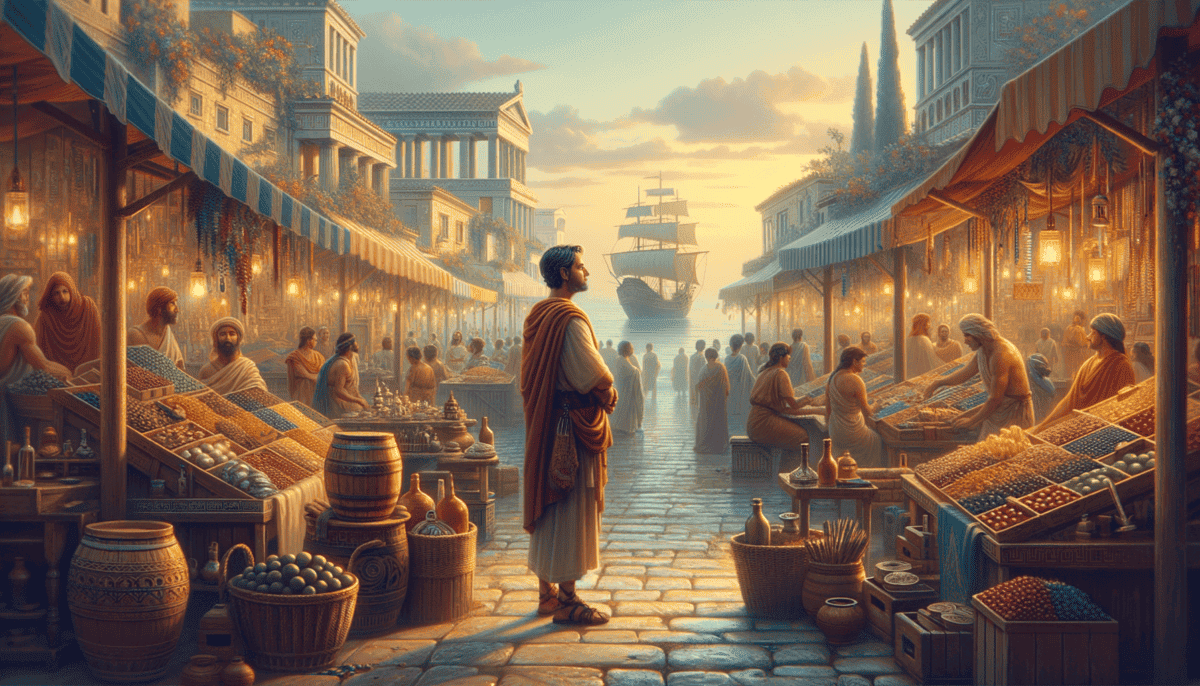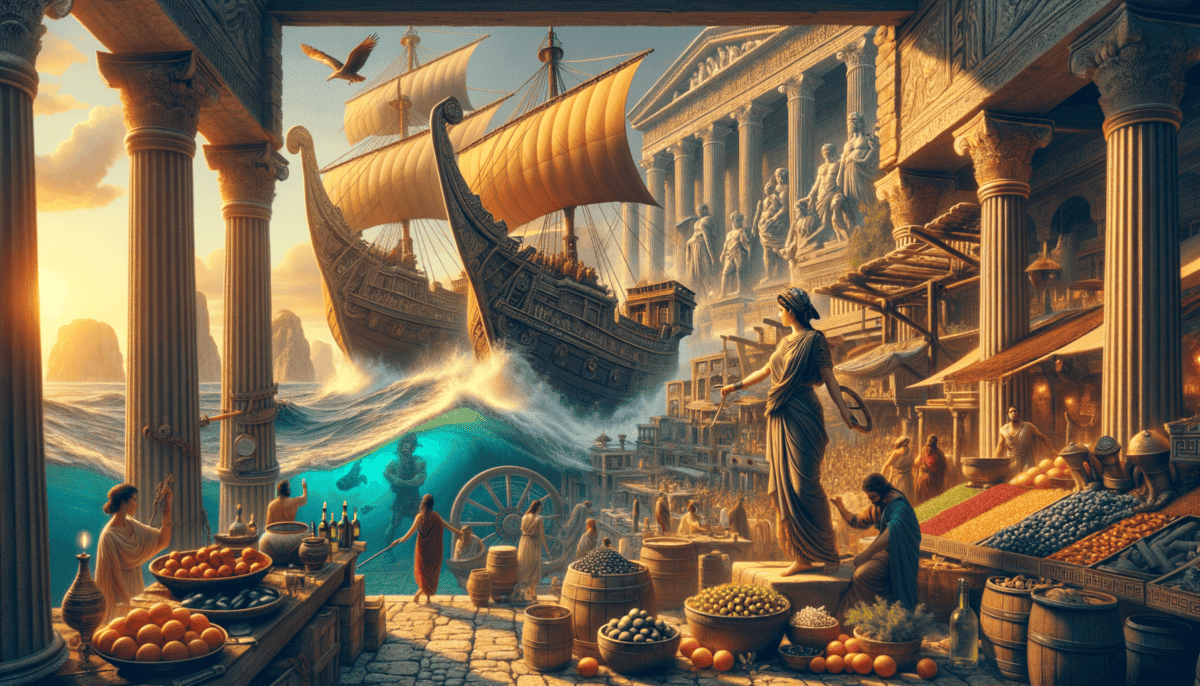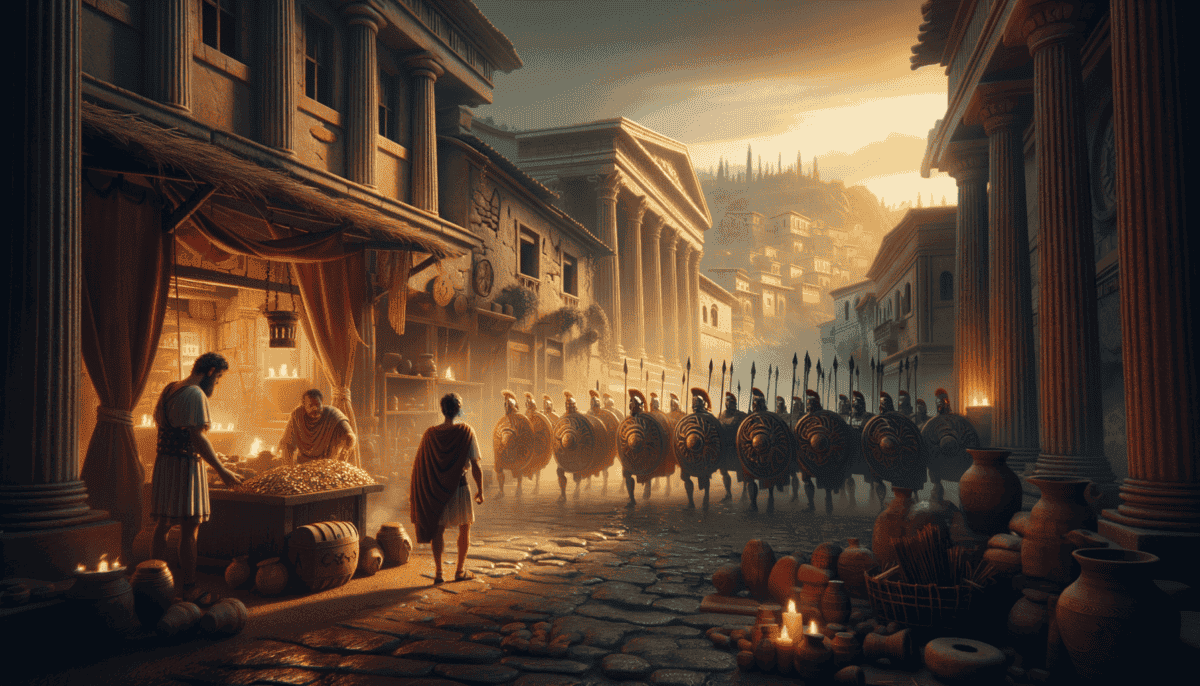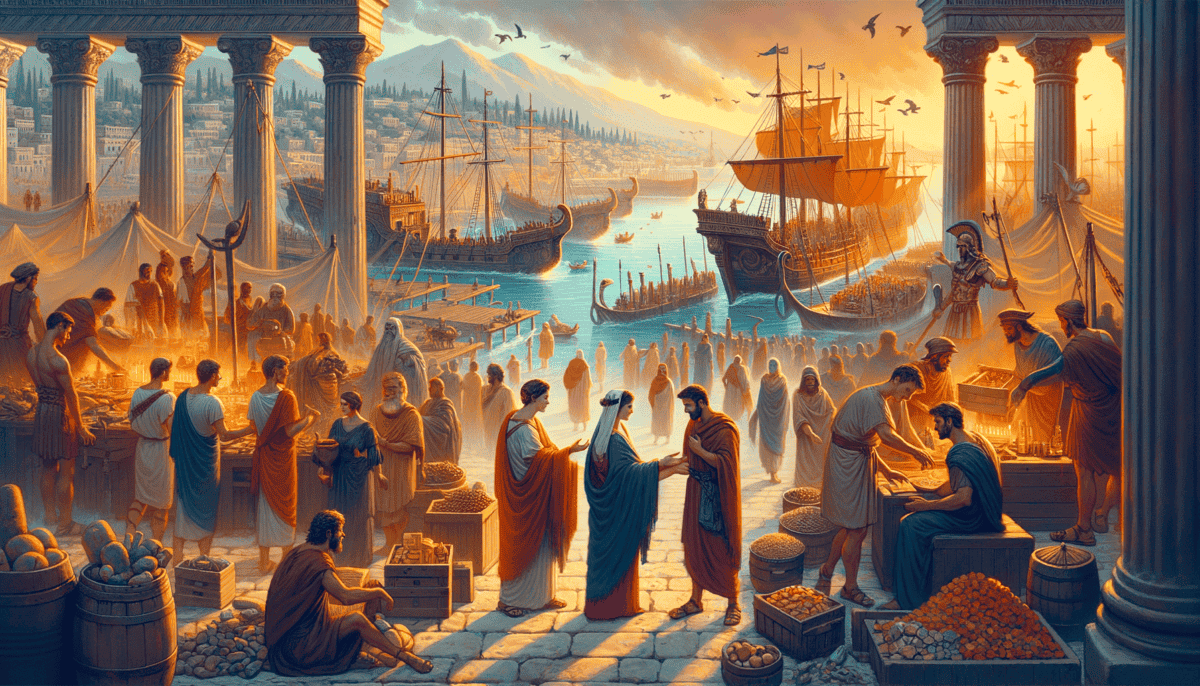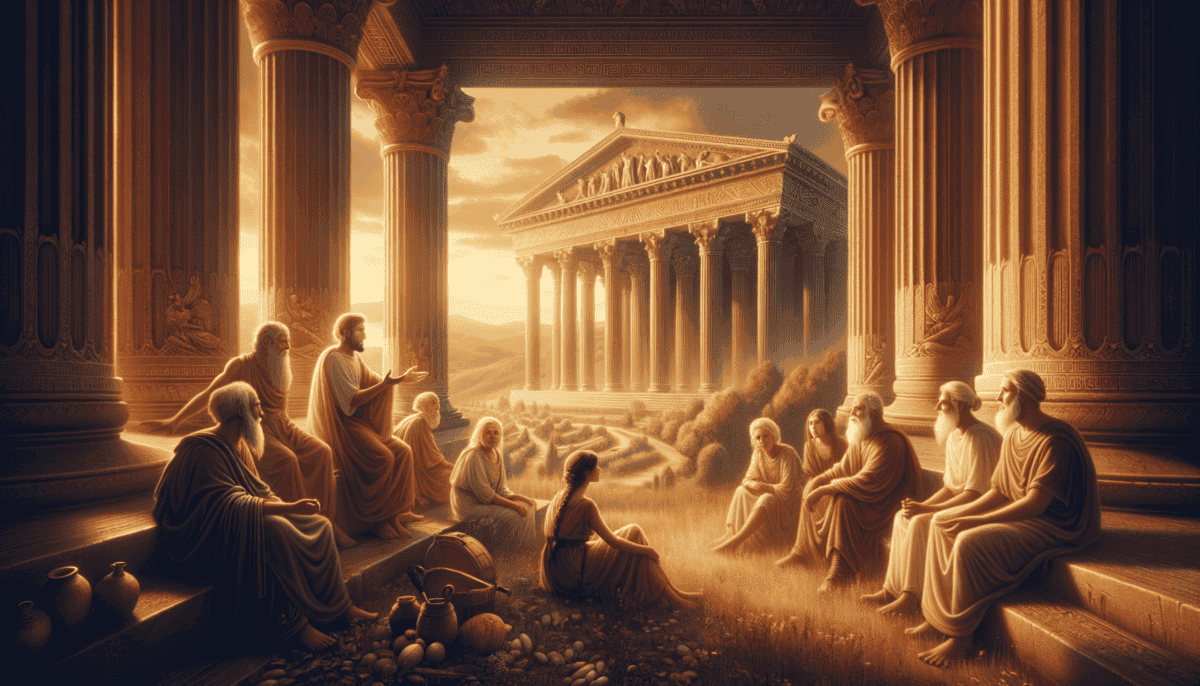A Time of Ships and Silver
The morning sun sparkled on the blue waters of Athens' port. Nikolas stood on the dock, watching his ships load with precious goods. The sweet smell of wine and olive oil filled the air.
"Another fine day for trading!" he called out to his workers. His favorite ship, the Sea Dragon, bobbed gently in the water.
The port was alive with activity. Sailors shouted back and forth as they carried clay pots full of olive oil. Others rolled barrels of sweet Greek wine up wooden planks. Colorful fabrics from far away lands waved in the breeze.
Sophia, the best navigator in Athens, walked up to Nikolas with a big smile. Her long dark hair was tied back with a red ribbon that matched her tunic.
"The winds are perfect today," she said. "We can sail all the way to Egypt with this breeze!"
Nikolas nodded happily. "What treasures will you bring back this time, Sophia?"
"Egyptian cotton, spices, and maybe some gold if we're lucky!" she laughed.
The Greek ships went everywhere in those days. They sailed to:
• Egypt for cotton and paper
• Phoenicia for purple dye
• The Black Sea for grain and fish
• Persia for fine jewelry
“Our ships rule these waters,” Nikolas said proudly. “From sunrise to sunset, Greek traders bring riches to Athens!”
Later that day, Nikolas walked through the marketplace. Shopkeepers called out to people passing by. The air smelled like fresh bread and roasted meat. Coins jingled as people bought and sold goods from all over the world.
A young boy tugged on Nikolas's sleeve. "Sir, will you tell me about your adventures at sea?"
Nikolas smiled and sat down on a stone bench. "Well, young one, let me tell you about the time we traded with pirates…"
The boy's eyes grew wide as Nikolas told stories of storms and far-off places. This was truly the golden age of Greek trade. Everyone knew that Greek ships could sail anywhere and trade with anyone.
As the sun began to set, Sophia's ship prepared to leave port. The Sea Dragon's white sails caught the wind.
"Safe travels!" Nikolas called out. "Bring back lots of treasures!"
Sophia waved from the ship's deck. "I always do! See you in two months!"
The port of Athens glowed orange in the sunset. Ships rocked gently in their spots. Nikolas smiled, knowing tomorrow would bring another busy day of trading. These were the best days to be a Greek merchant, when the seas belonged to Athens and her traders.
Little did they know that far across the sea, changes were coming that would change everything…
Dark Clouds on the Horizon
Sophia’s ship returned to Athens two months later, but something was different. The usual buzz of excitement at the dock felt quieter.
“Nikolas!” Sophia called out as she hurried down the gangplank. “We had trouble on our journey. Roman ships stopped us three times!”
Nikolas frowned. “Tell me everything, Sophia.”
“The Romans have big new ships,” she explained. “They made us pay extra money to pass through waters that used to be free for Greek traders.”
“Times are changing,” an old sailor named Marcus said. “The Romans are getting stronger every day.”
In the marketplace, Nikolas noticed fewer shops were open. Some of his friend’s trading stalls stood empty. The happy sounds of buying and selling were not as loud as before.
“Why are so many shops closed?” asked the same young boy who loved Nikolas’s stories.
“Well,” Nikolas said carefully, “some traders are having a hard time. The Romans want us to pay them to use the sea roads.”
That evening, Nikolas met with other traders at the Temple of Poseidon. Everyone had worried faces.
• Roman ships blocking trade routes
• Higher costs to sail
• Fewer customers in the markets
• Fighting between Greek cities
“Our cities need to work together!” Sophia said. “If Athens and Sparta keep fighting, Rome will only get stronger.”
But the Greek cities did not stop fighting. Each wanted to be the most powerful. While they fought each other, Rome grew bigger and stronger.
One morning, Nikolas watched as a huge Roman ship sailed into the harbor. Its red sails seemed to glow in the sunlight. Roman soldiers stood on the deck, their armor shining.
“Look at the size of that ship!” the young boy gasped.
“Yes,” Nikolas said quietly. “The Romans build everything big.”
Sophia walked up beside them. “We need to be smart, Nikolas. Maybe we can find new ways to trade.”
“What do you mean?” Nikolas asked.
“If we can’t beat the Romans,” she said, “maybe we can work with them instead.”
Nikolas watched as more Roman ships appeared on the horizon. The warm Greek sun still shone on the harbor, but dark clouds were gathering. Change was coming to their world, whether they liked it or not.
That night, Nikolas sat in his counting house, looking at his trading records. The numbers told a clear story – Greek trade was getting harder. But he remembered what Sophia said about being smart and finding new ways.
“Perhaps,” he thought, “we can learn something from these Romans…”
Waves of Change
The Roman ships grew bigger and stronger in the harbor. Their red sails filled the sky like giant wings. Sophia watched from the dock as three more Roman trading ships arrived.
“They’re everywhere now,” she whispered to Nikolas. Her eyes followed the Roman soldiers marching along the pier.
“My father had to sell his shop,” said Marcus, their old sailor friend. His voice was sad. “The Romans charge so much money to use the sea now. He couldn’t pay.”
Sophia put her hand on Marcus’s shoulder. “Many Greek families are having hard times.”
The young boy who loved stories tugged at Nikolas’s sleeve. “Why do the Romans get to make all the rules now?”
“Well,” Nikolas explained, “they have a very strong army. And they use their army to control the seas.”
“The world is changing,” Sophia said. “We must change too if we want to survive.”
That afternoon, a tall Roman merchant named Claudius visited Nikolas’s counting house. His fancy purple robe showed he was rich and powerful.
“Your Greek ships are small and old,” Claudius said. “Work for me instead. I can protect your trade.”
Nikolas felt angry, but he stayed calm. “Our ships have sailed these waters for hundreds of years.”
• Must use Roman ships
• Pay special taxes
• Follow Roman laws
• Work with Roman merchants
Later, Sophia met with her family. “We need to learn Roman ways,” she told them. “Maybe we can teach them some Greek ways too.”
Her little sister looked worried. “Will we have to speak Latin now?”
Sophia smiled. “We can speak both Greek and Latin. Being smart means learning new things.”
The next morning, Nikolas watched as Roman workers built a new marketplace. It was bigger than the old Greek one. They used strong Roman concrete that could last forever.
“Look how fast they build!” the young boy said with wide eyes.
“Yes,” Nikolas nodded. “The Romans are good builders. Maybe we can learn from them.”
Sophia appeared with news. “I made a deal with Claudius,” she said. “He will let us use his big ships if we show his sailors our secret trade routes.”
“Is that good?” asked the young boy.
“It’s different,” Sophia answered honestly. “But different doesn’t always mean bad.”
As the sun set, Nikolas and Sophia sat by the harbor. Roman ships and Greek ships floated side by side. The water looked the same as it always had, even if everything else was changing.
“Tomorrow,” Sophia said, “I sail on a Roman ship for the first time.”
Nikolas squeezed her hand. “Be safe, friend. Learn their ways. Maybe there’s room in this new world for both Romans and Greeks.”
A World United
The summer sun blazed over Athens as Nikolas walked through the new Roman marketplace. The smooth stone paths felt different under his feet. Roman soldiers stood guard at every corner. ️
“Everything’s so… Roman now,” the young boy said, following close behind.
Nikolas spotted Sophia returning from her first Roman trading voyage. She looked tired but smiled.
“How was it?” Nikolas asked.
“Different,” she said. “Their ships are bigger. They can carry more goods. And they have new ways to stay safe from pirates.”
The young boy’s eyes got big. “Pirates? Did you see any?”
Sophia laughed. “No, little one. The Roman navy keeps them away. That’s one good thing about the changes.”
“Maybe we can make the best of both worlds,” Nikolas said softly. “Greek wisdom and Roman strength.”
That afternoon, Claudius visited again. This time he brought sweet honey cakes.
“See? Roman treats can be good too,” he said with a friendly smile. “And look what your Greek olive oil has done for our Roman cooking!”
• Making olive oil
• Building beautiful statues
• Writing stories
• Making maps
Sophia pulled out a map she had drawn. It showed both Greek and Roman trading spots. “Together, we can trade with more places than ever before.”
The young boy pointed at the map. “Look how big the world is now!”
Nikolas had to agree. Roman roads connected cities that Greeks had never reached. Their big ships sailed to far-away places. ️
That evening, a feast brought everyone together. Greek musicians played while Roman dancers twirled. The food was a mix of Greek and Roman dishes.
“Try this Roman bread,” Sophia said to her sister. “It’s different, but good!”
Marcus came running up with news. “My father got a job! He’s teaching Roman sailors about the winds and stars!”
Nikolas smiled. “See? They need our knowledge just like we need their strength.”
The next day, Nikolas watched workers fix his old shop. They used strong Roman concrete but kept the beautiful Greek columns.
“It’s like the whole city now,” the young boy said wisely. “A little bit Greek, a little bit Roman.”
Sophia nodded. “And maybe that makes it better than before.”
As night fell, Nikolas stood on the hill above the harbor. Roman ships and Greek ships shared the water. The city glowed with oil lamps, some Greek, some Roman.
“Tomorrow,” he said to Sophia, “I start teaching Roman traders about Greek olive oil.”
“And I’ll show them how to read the stars like Greeks do,” she replied.
The young boy yawned. “Tell me a story,” he said. “A Greek story with Roman heroes!”
They all laughed. Maybe this new world wasn’t so bad after all. It was just… different. And different could be good.
Trading in New Waters
The morning sun sparkled on the waters of the Mediterranean. Sophia stood at the helm of a massive Roman trading ship. The vessel was three times bigger than her old Greek boat!
“Look how much we can carry now!” Sophia called to Nikolas, who was checking the cargo hold. Rows of amphoras filled with Greek olive oil lined the walls.
“The Romans really love our olive oil,” Nikolas smiled. “And their big ships help us sell more than ever!”
The young boy who always followed them around was exploring the ship with wide eyes. “It’s like a floating city!”
Claudius appeared from below deck. “Ready to sail to our new trading posts? We can reach Britain now!”
“Britain? I never dreamed we could sail so far!” Sophia exclaimed. “Roman roads and ships have made the world so much bigger.”
The new Roman trading system was amazing. They had special places called “ports” all around the sea. Each port had:
• Big warehouses
• Special money-counting rooms
• Guards to keep things safe
• Places for sailors to rest
• Maps showing all trade routes
“Remember when we used to trade just with nearby islands?” Nikolas asked Sophia.
“Now we can sell our goods everywhere!” she replied. “And look at these Roman coins – they work in every port!”
The young boy held up a shiny Roman coin. “It has the emperor’s face on it!”
That evening, they stopped at a new Roman port in Sicily. It was huge! Boats from all over the world were there.
“I see Egyptian ships!” the boy pointed. “And Persian ones too!”
Sophia checked her star charts. The Romans had added new routes to her old Greek maps. “With these new paths, we can sail all year long!”
Back on the ship, Claudius showed them something special – a Roman water wheel. “This helps us move heavy cargo easily,” he explained.
“Greek wisdom and Roman tools working together,” Nikolas nodded. “That’s what makes trade better now.”
As the sun set, they watched workers load more cargo. Roman soldiers kept everything safe and organized.
“Tomorrow we sail for Gaul,” Sophia said excitedly. “Another new place to trade!”
The young boy yawned. “Will you teach me to use the Roman compass?”
“Of course,” Sophia smiled. “And I’ll show you how Greeks use the stars too.”
Together, they watched the moon rise over the busy harbor. Greek ships and Roman ships bobbed side by side in the gentle waves. The world of trade was changing, growing, and becoming more exciting every day. ⭐
A Legacy of Two Seas
The summer sun was setting over Rome’s grand harbor at Ostia. Sophia and Nikolas sat with their grandchildren, watching ships sail into port. Twenty years had passed since the big changes in trade began.
“Tell us again about the old Greek trading days!” little Marcus begged. His sister Julia nodded eagerly.
Sophia smiled, pointing to an old Greek vase in their home. “See that vase? It tells our whole story.”
“When I was young,” Nikolas began, “Greek ships were small but mighty. We sailed by the stars and traded with our neighbors.”
“But then the Romans came with their big ideas,” Julia added. “And made everything bigger and better!”
Claudius, now older and wiser, joined them. “Not better – just different. We learned so much from Greek traders.”
The children watched as ships from all over the world sailed past:
• Greek olive oil ships
• Egyptian grain boats
• Persian spice traders
• British tin vessels
• Spanish silver carriers
“Look!” Marcus pointed excitedly. “That ship has both Greek and Roman symbols!”
Sophia nodded. “That’s right. The best parts of both worlds working together.” ⚡
A young sailor approached them. “Teacher Sophia! Your maps helped me sail all the way to Britain!”
“And my Roman roads got your cargo there safely,” Claudius winked. ️
Julia played with an old Greek coin and a new Roman one. “Grandmother, why do we need both?”
“Because each tells part of our story,” Sophia explained. “Like mixing honey and olive oil to make something tasty!”
As night fell, lanterns lit up the harbor. The lighthouse beam swept across waters that had seen so much change.
“What happens next?” Marcus asked sleepily.
Nikolas hugged his grandson. “The story keeps growing. Maybe you’ll write the next chapter!”
Sophia looked at the stars – the same ones that had guided Greek ships long ago. Now they twinkled above Roman vessels too.
“We didn’t lose our old ways,” she said softly. “We made them bigger. Greek wisdom and Roman strength – like two streams joining to make a mighty river.”
The children drifted off to sleep as their grandparents watched the nighttime trading continue. Ships came and went, carrying goods and stories across the sea.
In the moonlight, an old Greek trading map hung next to a new Roman one. Together they showed how far they’d come – and how the future would hold even more adventures.
The Mediterranean waves lapped gently at the shore, telling tales of both Greek and Roman ships, of old ways and new paths, of a world that grew larger through the power of trade. And somewhere on those waters, new stories were just beginning. ⭐


